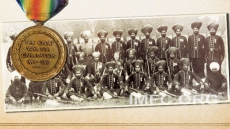Having just launched last year, the Guru Nanak Institute of Global Studies (GNI) is a PTIB (Private Training Institution Branch) approved, non-profit educational and research institute.
Embracing the principles of Guru Nanak (the revealer of Sikhi), GNI is committed to celebrating cultural diversity and a spirit of co-existence through research, education and service. Not exclusive to the Sikh community, GNI welcomes people from all communities, regardless of their background, religion or beliefs.

GNI currently offers four diploma and certificate programs: 1) Sikh Studies Diploma, 2) Punjabi Studies Certificate, 3) Gurmat Music Diploma, 4) Frontline Management Certificate. Soon they will also be offering both Business Administration Diploma and Operation and Supply Chain Management Diploma Programs.These programs are truly the first of their kind across North America as no other local institution is providing recognized post-secondary diploma and certificate programs in Sikh Studies and Gurmat Music.
For example, many post-secondary institutions provide Asian Studies with Sikh studies encompassed within that, however the GNI Sikh Studies program is specifically focused on Sikhism from an academic perspective, versus a religious one. Students become acquainted with Sikh religious, moral, and social values and attain a critical appreciation for theorizing religion and have a solid understanding of the Sikh ethos and how they connect with social justice.
The Gurmat Music Diploma is also the first of its kind in Canada. This program has a series of courses to prepare students for a career/path towards Sikh music’s Shabad Keertan (spiritual hymn singing) tradition, providing a combination of theory and practical performance examinations. The courses will allow students an option to take vocal, instrumental (stringed instruments), or percussion (Tabla/Jodi) streams.
These programs are supported by GNI’s faculty of globally based university professors from a variety of fields and disciplines, with strong representation from Canadian post-secondary institutions, along with an academic board of educators and researchers from across Canada, the USA, the UK and India. Currently, all programs will be administered in an online learning environment.
Their programs are ideal for professionals of any discipline looking for ways to connect and engage with the South Asian community in a more profound way. Professionals in the medical, legal or other professional vocations have found GNI’s courses to be a powerful way to better serve their South Asian clientele. They are also a worthwhile avenue for those of South Asian descent who would like to better understand Sikhi or brush up on their Punjabi skills. Often having learned those listening and practice, the formal learnings can truly enhance a conversational Punjabi speaker's skills to an expert level.
Unlike other post-secondary institutions, as a non-profit, they are also committed to being cost-effective with an incredibly accessible pricing model compared to similar private institutes and by providing financial aid by way of scholarships and bursaries to deserving students, looking at not only academic achievements but family income, community involvement and sports/other personal achievements.
“We are committed to promoting our values of service to humanity, cross-cultural understanding, the lifelong pursuit of learning, critical thinking, and diversity in all its forms. We will ensure equal and open access to all prospective students by alleviating funding and other financial barriers. We firmly believe that no student should be denied education due to a lack of financial means and to support this philosophy we have a very liberal scholarship and bursary policy.” - Board Chair, Gian Singh Sandhu.
Former Deputy Minister of Education, David Byng, stated, “I’m very excited to support the Guru Nanak Institute of Global Studies joining the ranks of British Columbia’s post-secondary sector. As our province becomes a more diverse and inclusive society, GNI will be a tremendous resource to both local and global learners and is a fantastic addition to the post-secondary landscape.”
Applications for all programs are now open and prospective students can learn more about the courses and apply online at www.gurunanakinstitute.ca.







